“Why do I get so nervous around new people? How do you overcome your conversation anxiety?”
I remember how nervous I could get when I met new people.
I could blank out and not come up with anything to say. Once, at a party, I panicked and went to the bathroom. Then I sneaked out and walked home.
In this guide, I’ll show you how even we who are born socially anxious can feel confident and even relax around other people.
1. Focus on getting to know people
Focus on the conversation you’re having and try to get to know the person.
This makes most introverts more confident. Instead of focusing on every little thing we might be doing wrong, we’re able to be present with the other person.[2]
When we fully focus on the conversation, it can make us curious. Curiosity activates our “exploratory drive” and questions automatically start popping up in our heads. That makes it easier to know what to say.[3][4]
That’s part of why it’s so easy to talk to close friends. We don’t run out of things to say because we’re focused on the conversation or the surroundings rather than what they might think of us.
If you walk into a room full of strangers, you can get the same results by focusing on those around you even if you’re not talking to someone. “I wonder what her job might be”. “That’s a nice T-shirt”, etc.
2. Check in on yourself occasionally
Sometimes we feel the need to check in on ourselves. For example, I came to think about my posture the other day in a conversation. I corrected my posture and then moved my attention back to the conversation.
It’s OK to “check-in” on yourself like that. That can help us feel a little more in control. We just don’t want to get stuck thinking about ourselves.
3. Accept your thoughts and feelings
If you feel worried or have negative thoughts like “what will they think of me” – do the following:
If you try to fight your feelings of nervousness or anxiety, that can make you feel worse about yourself. When you instead accept that you are nervous, you take control over those feelings.[5]
“I feel nervous right now and that’s OK”. After all, being nervous isn’t worse or more dangerous than being hungry or tired. They are all feelings.
4. Practice focusing outward while watching movies
Sometimes, the brain wants to do the opposite of what we want it to do. When we want to focus on others, it wants to worry about how others see us.[6]
You can teach your brain to focus outward (rather than worrying about you) by repeatedly moving your focus back to someone else.[7]
The next time you’re watching someone talking on Youtube or in a movie, you can practice re-focusing your attention.
Move your attention from the person you’re watching (their appearance, manners, energy level, etc), to the topic they’re talking about (ask yourself questions about it, practice being curious about it), to yourself (how you feel, how others might view you), then back to the person, and repeat several times.
Training your attention outside of social settings makes it easier to refocus in real social settings.[8]
5. Practice being curious about others
Let’s say that right now, you meet this woman at an event:

You ask her how she’s doing, and she replies:
“I’m alright but jetlagged. I just came home from France”.
If you’re like I used to be, your anxiety might kick in and say something like this:
“Uh oh, she’ll think I’m a loser for never being to Europe. She looks skeptical, I can tell. Hmm, should I tell her about that time I was in Cancun? I mean, that shows I’ve traveled at least a bit. WHAT SHOULD I SAY?”
Confident people focus on what she says, and are curious about it.
“Oh, she’s been to France – how come? What did she do there? Did she like it? Where in France? What was the weather like? Has she been there before?”
You shouldn’t ask all these questions. This is just to show your internal monologue. But – you can ask ANY of those questions. Focusing outward makes it EASIER to come up with things to say.
Scroll back up at the photo and see if you can come up with some more questions about her, by focusing on what she said. That is a GREAT exercise to learn to refocus and be better at making conversation. If you can’t come up with anything, that’s fine! But that’s a sign that you want to practice focusing outward. Here, I’ve written about how to make interesting conversation by focusing outward.
6. See nervousness as excitement
When we do something new, we feel fear. But doing new things gives us experience and makes us feel happier with life.[9] In other words, fear and nervosity is a sign of something good about to happen!
In fact, the body’s response to nervousness and excitement is exactly the same.[10]
When you’re excited or scared you’re feeling the same feeling. It’s just that we tend to interpret anxiety as something bad and excitement as something good.
You can say to yourself: What I feel is excitement for something good about to happen.
7. Do things just slightly outside your comfort zone
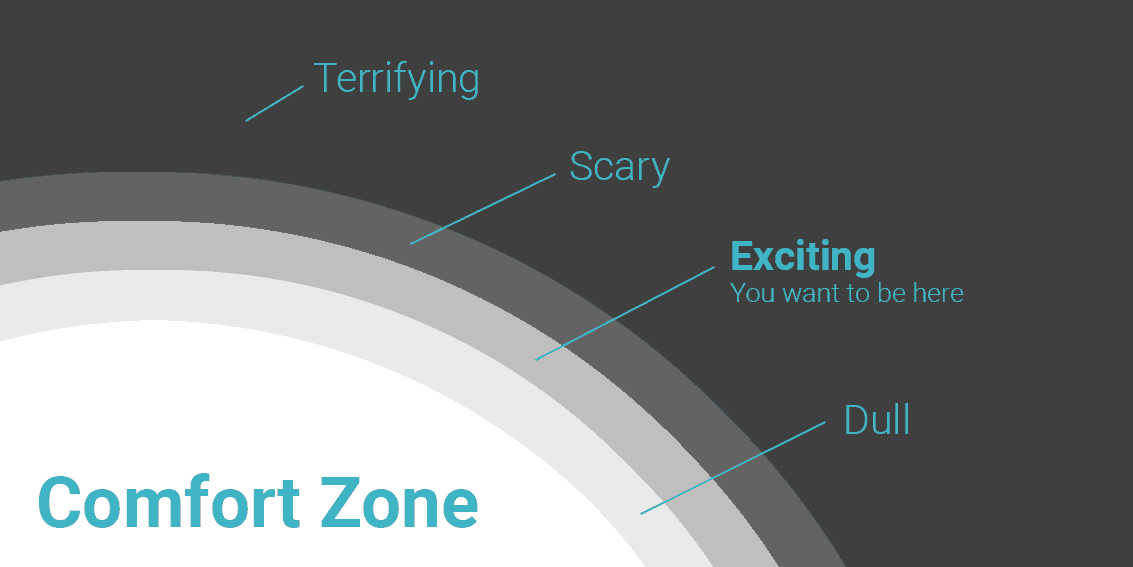
There’s no point in going way out of our comfort zone. We want to be in the sweet spot of it. We can only be in the terrifying part for a few minutes. We can be in the exciting zone regularly as a habit.
Practicing terrifying things can help you do terrifying things in the future. You want to build your ability to do things that are meaningful to you, like meeting new, interesting people or having a relaxed conversation and form a connection.
Here’s an example of what this can look like in real life:
If you’re used to just nodding to the cashier in your supermarket, say “Hi”. If you’re used to just saying “Hi”, ask her how she’s doing. If you’re used to asking her how she’s doing, joke with her (And so on).
LESSON LEARNED: Don’t do what’s dull. Don’t do what’s terrifying. Make it a habit to do things SLIGHTLY out of what you’re used to. That way, your comfort expands a little every day.
(Therapists call this graded exposure. This is one of the methods that therapists use to treat social anxiety.[12] It’s something you can try on your own, but if you’d like extra support, you can find a therapist or counselor and they will give you expert guidance.)
8. Understand how insecure other people are
Look at these numbers. They might surprise you.
- 1 in 10 have had social anxiety at some point in their lives.[13]
- 1 in 3 millennials say they have no close friends.[14]
- 5 out of 10 see themselves as shy.[15][16]
- 5 out of 10 don’t like the way they look.[17] (Only 4% of women feel comfortable describing themselves as beautiful.)[18]
- 8 of 10 feel uncomfortable being the center of attention.[19]
- 9 out of 10 have some type of body insecurity.[20][21]
Realizing this changed something in me.
Before, I assumed that everyone was confident but me. Now, I know that people are way more insecure than they look.
Let’s do an exercise that uses this realization to our advantage.
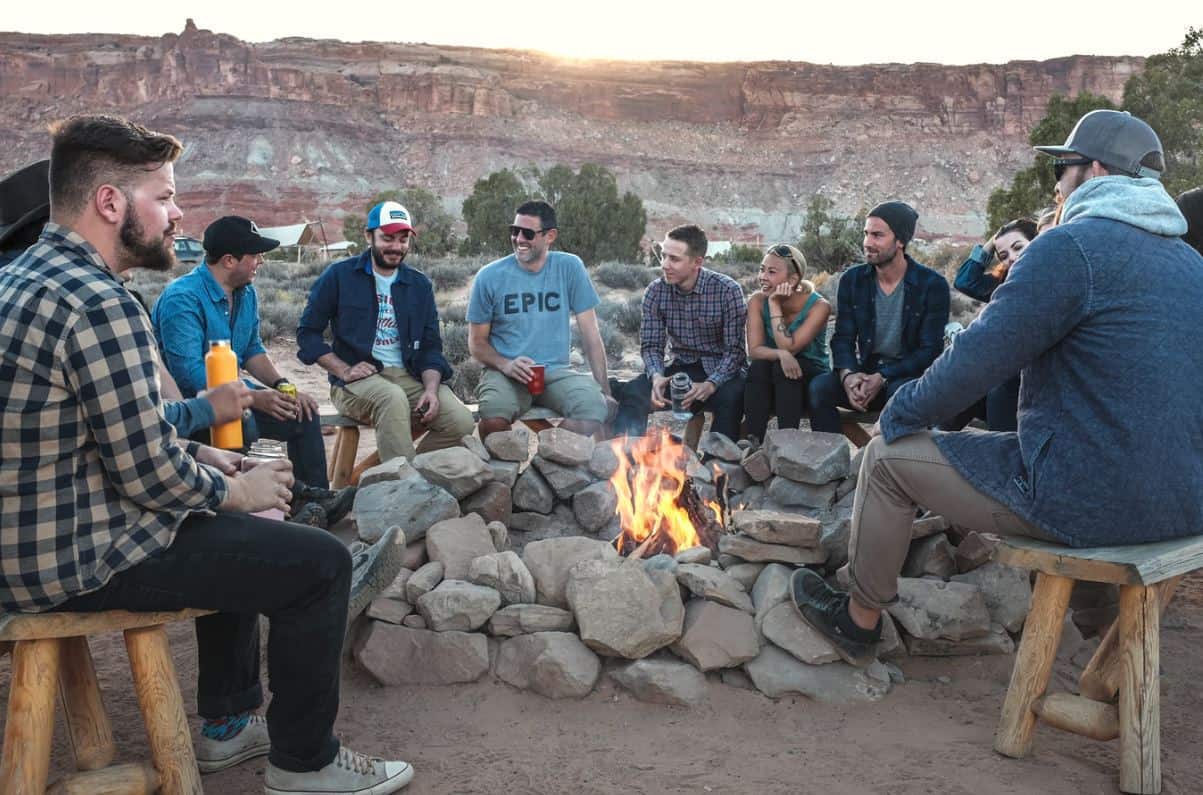
Imagine that you’re at the outdoor meetup event above and don’t know anyone. How would you feel? Quite uncomfortable, I’d guess. Now, look at the image again but focus on how 9 out of 10 of them carry some kind of insecurity. Some might be loud and intimidating, others look calm, but that’s their way of looking confident. In reality, they’re quite insecure!
Therapists describe this as acquiring more realistic beliefs.[22] It’s when we crush the false idea that everyone is confident but us.
Simply reminding us of this fact makes us less nervous around people.[23]
9. See talking to someone as helping them out
Psychologist and social skills expert Dr. Daniel Wendler explains:
When we carry negative beliefs about ourselves, we can behave in a way that creates a self-fulfilling prophecy.
If you believe that you’re the only one at the gathering who feels anxious or awkward, then maybe you’re going to stay silent or leave early, and that’s just going to make you feel more isolated from everyone else.
If you instead can update your belief with the more realistic view that lots of other people at the party also feel anxious, you might realize that you can actually help someone else out by starting a conversation with them.
Instead of choosing to withdraw you choose to engage.
10. Speak to yourself as you would to a friend
If you fear that people will judge you, or think bad things about you, it can be a symptom that you are judging and thinking bad things about yourself. Psychologists call this projection: We project our own view of ourselves onto others.[24] As long as we’ll judge ourselves, we’ll assume that others will judge us, too.
With this in mind, the way to stop feeling judged by others is to stop judging yourself. So how do you do that? When we speak to ourselves in a different way, we can change the way we value ourselves.[25]
Instead of saying things like…
“I’m so stupid/ugly/worthless”
You can say…
“I made a mistake, and that’s human. Everyone makes mistakes.”.
Or, say that you judge yourself for not being good socially. You can remind yourself of a moment where you did do good socially.
Some find it helpful to keep a journal where they write three positive things about themselves each day. The things can be as small as “I brushed my teeth today” or “I can be funny sometimes”. The important thing is to be consistent.
By challenging your own judging voice, you slowly change the way you see yourself. As a result, you also change the way you assume that others see you. Sometimes it can be hard to break out of these thought patterns by yourself. In these cases, therapy can help.
11. Dare to be friendly even when you’re nervous
When I met new people, I was always cautious (To not risk being rejected). People saw me as aloof.
Naturally, they responded by being aloof back. That reinforced my worldview that people didn’t like me.
When I realized this, I decided to try to dare to be warm toward people FIRST. (Just as an experiment – I didn’t think it would even work.)
But the results were amazing. When I dared to be warm toward people off the bat, they were warm toward me, too!
Here are some examples of showing warmth:
- Asking people a question or two about how they’re doing and what they’ve been up to. It’s effective because it signals that you care.
- If someone pulls a joke or tells a story, show appreciation by laughing or making a positive remark. It can be as little as “Haha, I love that story!”
- If you like what someone’s doing, let them know about it. “I liked what you said before regarding apartment designs”.
- If you tend to “play it cool” or restrict your facial expressions as a safety behavior, practice being more expressive. (Acting more like you do with people you are comfortable with).
We dislike people who we think dislike us. We like people who we think like us.[26]
Here, I explain in more detail how to be more friendly.
12. Choose to accept your flaws
I used to obsess that my nose was big. I decided to accept that it was part of me. I stopped trying to hide the fact that I had a big nose and owned it. I didn’t try to convince myself that my nose was small. Instead, I accepted the fact that my nose isn’t small. As a result, I stopped worrying about being judged for my nose. That made me more comfortable and likable.
If we walk through life hoping that no one notices our insecurities or fears, we will always be afraid that someone might “find out”.
We can choose to accept all our flaws. A friend of mine stopped being afraid to share that he was afraid and had insecurities. Something unexpected happened. When he stopped caring about those flaws, his nervosity faded away. This doesn’t mean that he walks up to people and tell them about his insecurities. It’s about accepting that it’s OK that people DO KNOW about our insecurities.
If someone would walk up to you and say: Are you nervous? It’s a relief to not have to hide it, but to be able to say “Yes, I am.”
Being completely accepting of ourselves likes this makes us less nervous.[27]
Here, I talk more about how to overcome self-doubt.
13. Use your surroundings for inspiration
Focus on your surroundings, the situation, and those you meet and use it as an inspiration for new conversation topics. Here are some examples of how to do this in practice.
Topics inspired by the situation
If you’re, say, in the lunchroom at work or outside of the classroom in school, people aren’t always prepared to socialize. Here, you want to “ease in” by asking something regarding the situation first…
“Excuse me, do you know when this class will start?”
“Hi, where did you find the coke?”
“Do you know if there’s another bathroom around here?”
You’ll probably just get a short yes or no to this question, but a simple question like this is important as a warm-up to make your next question more natural and not as “out of the blue”.
Now, you can ask a question based on the person – like, “Thanks. I’m David by the way. I started working here a few days ago. How do you find the place?”
Topics inspired by the surroundings
Making small statements about the surroundings is great at semi-formal events like a dinner at a friend’s place or a small party. These small statements are obvious and some think they are “needless”, but they are important: They show that you’re friendly and open for interaction.
“That salmon looks good.”
“It’s warm in here!”
“What a nice place!”
Topics inspired by the person you meet
You can use these topics in places where you’re expected to socialize (mingles, corporate activities, the first day at a new job or school, etc).
Or, you can use them when you’ve already made some small talk with someone.
“How do you know people here?”
“How come you started working in…?”
“What do you like the most about…?”
Focus outward as I talked about at the beginning of this guide. It will make it easier to come up with questions like these.
It’s not about memorizing questions – it’s about focusing outward and practicing being curious about what you see.
If you use questions and thoughts that come up because of this curiosity, you’ll be able to have a conversation that feels authentic.
But how do you become good at this?
14. Practice coming up with statements in your head
I made it a habit to make statements and ask questions in my head about stuff I saw when I walked down the street.
After some time, I automatically started focusing outward instead of worrying as much about me.
Here’s an exercise you can do right now to come up with these statements:
1. Look around your room, and make statements in your head about things you see.
“I like that lamp” “That plant needs water” “The sun really lights up this room” “The countertop is so messy” (And so on).
2. When you go outside, ask yourself questions about those you see
“I wonder where he’s from?” “I wonder what she’s doing for work?” “Is she nervous or is that how she always looks?”
Notice how this makes you less self-conscious.
When you practice this new way of thinking, coming up with new topics gets easier.
When a topic dies out, you can naturally start a new one based on thoughts you already have in your head.
“Is that a Samsung phone you got there? Happy with it? I’m thinking about ditching my iPhone.”
If you want to go deeper into starting a conversation, read my complete guide here:
How to start a conversation. In that guide, I also talk about what to do after the first few sentences.
15. Return to earlier conversation topics
When a topic runs dry with someone you’ve talked with for a while, jump back to any of the things you’ve talked about before.
Here’s an example from a conversation I had the other day:
She: So yeah, that’s why I like Canon better than Sony because the second-hand market is much larger for Canon…
Me: Interesting… (Conversation dies out)
Me: You mentioned that you lived in Ukraine earlier. Did you make films there as well or what did you do?
If this feels hard, it gets easier when you focus outward as I talked about at the beginning of this article.
Think back to a conversation you had with someone:
- What topics did you cover?
- What could you ask about those topics?
“But David, I can’t come up with any questions!”
If you have a hard time coming up with questions, you want to focus more on the actual conversation. (Earlier in this guide I talked about how curiosity activates our “exploratory drive”.)
When you watch a movie you like, questions pop up in your head all the time. “Who’s the murderer?” “Who took the gun?”. Why? Because focus leads to curiosity. In the same way, you want to focus on the conversation you’re having.
Here’s our guide on how to avoid awkward silence.
16. Ask yourself whether mistakes really matter
Know that confident people say as many stupid things as nervous people do. It’s just not as big of a deal for them.
I felt like I was always just one wrong word from losing everyone’s approval. I thought that I had to be PERFECT.
It’s normal to have some fear of making mistakes – nobody wants to mess up. But the issue is having TOO MUCH fear of making mistakes.
Psychologists call this Catastrophizing – when you believe that a social mistake means YOUR LIFE IS RUINED and PEOPLE HATE YOU and therefore YOU MUST AVOID IT AT ALL COSTS.[28]
Meanwhile, a more realistic belief is that a social mistake would create a minor socially awkward moment that would be uncomfortable but would be forgotten in ten minutes.
Fear of being judged, nervousness, and social anxiety, all boils down to being overly afraid of making mistakes.[29] In other words, anxious people overestimate the effect of social mistakes. We think that for people to like us, we have to be perfect. If we mess up, everyone will judge us.
When you beat yourself up for something you said, ask yourself if you had cared if someone else had said it. Would you dislike the person? Or would you just find that person a bit more relatable?
17. Ask what a confident person would have done
When you feel like you’ve messed up, ask yourself how a confident person would have reacted if they’d made the same mistake.
Do you know a really confident person? If so, you can have that person as your point of reference. Or, you could have someone like The Rock or Jennifer Lawrence in mind. How would they have reacted if they’d made the same mistake you just made?
Most often, we can assume that they would’ve just made a joke about it or wouldn’t care.
18. Ask something slightly personal
When I asked my readers what made you the most nervous in social settings, one issue that came up was the worry of not being interesting enough.
You won’t get to know someone by talking about facts and opinions. When we switch over to talk about what’s personal, the conversation gets interesting.[30]
Maybe you talk about how rents are high. If we get stuck on this topic, most people get bored after a while. So, we want to switch the conversation into PERSONAL MODE.
So, maybe you say “Yeah, the rents are ridiculous. I have this dream to move to the countryside one day and buy my own house instead. Where do you think you’ll be living in a few years?”
Do you see what happened there?
By sharing something slightly personal, the conversation feels more interesting!
Here’s a video where I explain more in detail:
19. Give compliments freely
When you think of really enjoyable conversations, especially with people you don’t know well, you can probably remember one or two where someone gave you an unexpected compliment. A meaningful compliment can make the interaction warmer and less awkward.
I didn’t used to give compliments. I didn’t think anyone would care enough about my opinion to want them. It wasn’t until a friend challenged me to compliment at least one person per day for a week that I realized how much people really appreciate having someone say something nice for no reason.
Avoid compliments about looks and appearance. But except for that, don’t try hard to think of compliments. That might come across as fake. Instead, try not to censor compliments that you think of spontaneously. If you think something nice, try saying it.
20. Go to events with a clear activity
Having an activity to do can help you to be less nervous in conversation. The aim here is to make sure that you have something to focus on other than your anxiety.
Volunteering is a really great option for this. Whether it’s helping to pack food parcels or walking dogs at the local animal shelter, there will probably always be a question you can ask about what you’re doing. The same is true of sports groups, book clubs, art classes, and more.
As you get to know people better, you will hopefully start to feel less nervous and can start to relax and move the conversation onto more personal topics.
21. Focus on your breathing to avoid panicking
Controlling your breathing can be helpful if you’re starting to feel overwhelmed, as it is shown to reduce anxiety.[31] If you feel your conversation anxiety kick in and you start to panic, it’s ok to take a short break to calm down. Excuse yourself to the bathroom or another private space and spend a minute paying attention to your breathing.
Start by just paying attention to your breathing. Notice how fast it is and whether it’s shallow or deep. After about a minute of this, try to breathe a little slower and deeper. Breathe in for 3 or 4 seconds and breathe out for about the same. Once you feel a little calmer, rejoin the event.
How to not get nervous speaking in public
Lots of people suffer from a fear of public speaking (speech anxiety), especially people who already find social situations stressful. Public speaking nerves are so common that colleges and universities around the world have at least some kind of presentation skills as part of their assessments.
The good news is that you can overcome these difficulties and control your nerves.
1. Focus on why you’re giving the talk
In the same way that we can get caught up inside our own heads when making conversation, it’s easy to focus on the act of public speaking and ignore what you’re trying to do. We worry more about our presentation nerves than we do about what we’re actually trying to achieve.
Think about why you’re making this speech. Is it to celebrate a close friend, for example as a best man toast at a wedding? In that case, focus on your friend. You might be trying to teach a group of people something new. That’s fine. Remember that they’re not there to watch a performance. They’re there to learn.
When you focus on the reason you’re giving a talk, it makes it easier to ignore the negative self-talk and worry. It also gives you a better way to measure how you did. Was your friend pleased with your toast? Did your group learn something new? If so, you did great.
2. Speak slowly and pause
Every guide to overcoming presentation nerves will tell you the same thing; it’s ok to slow down. Speaking slowly and pausing allows your audience time to really take in what you’re saying and also gives you time to relax a little and remember what you are about to say next.
Speaking this slowly will probably feel unnatural to begin with. This is where practice comes in.
3. Practice a lot
Most things are scary the first time you do them. The more public speaking you do, the less scary it becomes. Consider joining an organization such as Toastmasters International, which is designed to help people get used to public speaking.
Practice each speech as well. The more times you do it, the easier it can be to remember. Consider recording yourself. Each time you practice, pick out one thing that you want to work on and try to do that better next time. When you watch the recordings, make sure that you also notice all of the things that you have done right or gotten better at.
4. If it goes wrong, pretend to be cool
As with everything else, public speaking can sometimes go wrong. You might forget what you’re about to say, your presentation might not load on the screen or you might get the microphone stuck in your hair. I’ve seen all of these happen in professional presentations and it’s been fine.
The person who forgot what they were about to say took a sip of water and said “And this is why we bring notes”. The audience chuckled while she checked her notes and she carried on. Afterwards, she told me that she’d been cringing inside but she’d just tried to look cool about it. Honestly, we were all really impressed at how relaxed she’d seemed.
Pretending to be relaxed about mistakes isn’t easy. Try having a prepared reaction to potential problems. You could say “Well, that wasn’t in my plan. Oh well. Let’s carry on anyway”. You might not feel relaxed to start with, but this really is an area where it’s worth trying to ‘fake it till you make it’.
This article was co-written with Daniel Wendler, PsyD. He is a two-time TEDx-speaker, author of the bestseller book Improve your Social Skills, and founder of the now 1 million members subreddit /socialskills. Read more about Dan.


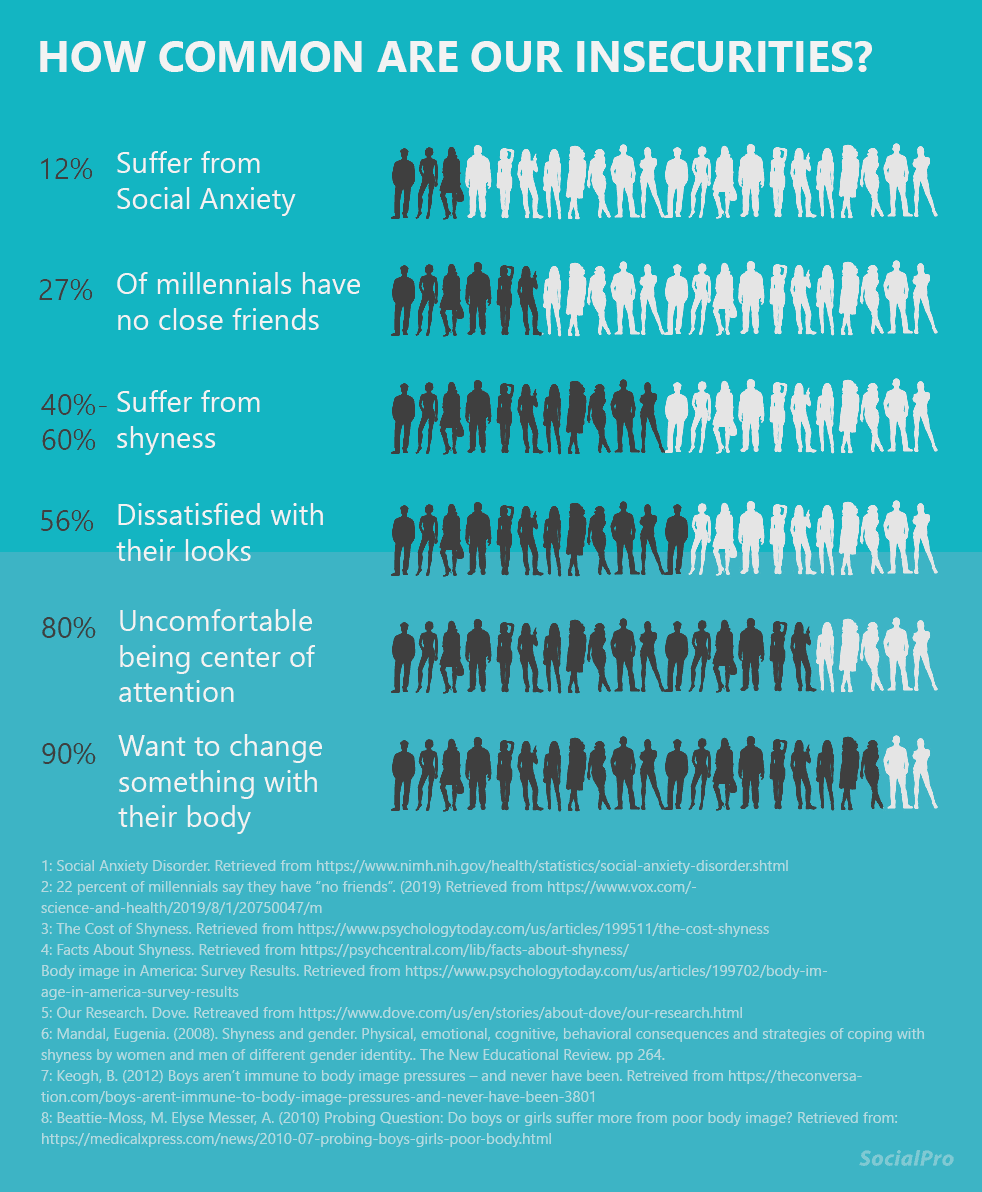





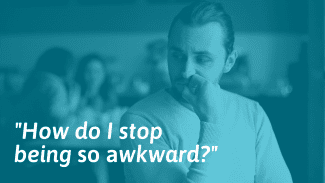


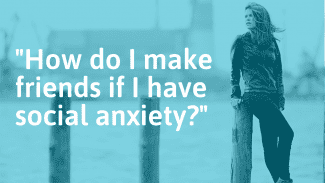
Hi, I am from Tamilnadu, India. I have completed my bachelor’s degree in chemical engineering in 2017. Since then I have been a disappointment to myself. I don’t have any particular skill to state. I can’t address myself properly. I don’t know what category I fall into. I am unemployed but I don’t want to be an employee. I am not a student of any institution. I don’t have any experience at all. I don’t have a hobby or passion for anything. The one thing I am good at is negative imagination. I don’t know the correct word for it. I just imagine things that didn’t and won’t happen, which are extremely negative like the death of a person and all. Then I start to think of the outcomes of the situation that didn’t happen and start to worry, regret and mourn with the imagination. I am scared of my own brain. It doesn’t think and see anything in a good way. I fear all the things around me like speaking with others, standing/walking in public places, going to a shop is scary to me. I am always afraid of what others think of me and they definitely hate me and see me as an imposter. I am away from my home and I am staying with my friend. Even to him and to my family I can’t explain myself and I often say lies to them to hide what I actually think and do. I can’t come out of my comfort zone. I stay inside the room all day and speak to no one. I am not eating well. This negativity, fear and anxiety pulling me towards mental hell. Trying to reach help online is also because of my insecurities.
I lack confidence, motivation, purpose, inspiration. Lately, I just sit idle thinking and worrying about nothing and wasting 24 hours a day. And I have more to say but I think you get the point, right?
Dear Dinesh,
I relate to your story. I used to complain about everything and everyone. I was never happy with my life because I would focus on the things I did not have. That was me until I realized that things will never be perfect and that my goal in life is to be a better person every day regardless of what life throws at me. My advise to you is to try being nicer to yourself. Focusing on the negative side of life is mental and physical torture. If you want things to change, you need to start somewhere and with persistence you will obtain anything. Dedicate some time to watch videos on personal development. Read about personal development (for example, Relentless Optimism by Darrin Donnelly). You will likely pick up on tips and techniques to achieve whatever it is that fulfills you.
I get nervous around the opposite sex.
Very nice article and very relatable. The worst thing abput social anxiety is that it makes you feel alienated. I learned a couple of things hear that hopefullly I can use
These methods are spot on. The way how you explain how shy people feel in social situations is something that I definitely relate to. Thank you for writing this page and I will try out your methods.
The instances you wrote about how shy people felt in certain situations are spot on. I feel those feelings every time I try to open up. Thank you for writing this detailed page! I will try your methods!
generally, i am pretty comfortable socially. unless it’s a guy i like!! in that case, i can become paralyzingly nervous, to the point where i start shaking. that is my main issue.
i really need to get over this. case in point, today. i’m at work, (i’m a cashier, so short friendly chats are a part of my job) and the guy i like comes in. i’ve spoken to him several times before and it was great! but, now i’ve had time to THINK about it. so despite the friendly little convos we’ve already had, i see him, and my heart starts racing. i start to notice that i am shaking. so i’m getting his items and saying very little, because i’m focusing on trying to stay calm. then, i have to use the POS, meaning touch my fingers to the computer screen to ring him up, and i can see that my hands are shaking, and i’m thinking about how he can see it too.. it’s just horrifying.
i know i am totally psyching myself out for whatever masochistic reason. and pushing away someone who i would like to get to know better!! but my body won’t cooperate. and the nature of the job makes it tricky, too, because i’m sure i could calm down after a few minutes, but i don’t have that much time. so i probably ended up leaving a bad impression today, or at least the impression that i don’t want to talk to him.
this isn’t the first time this has happened. initial success, but then getting nervous and ruining things. any thoughts..?
Could you just pretend that he likes you too?
Great post and very helpful as well to overcome the anxiety when facing new people. I would like to share it with my friends too. Keep sharing such helpful tips.
Thank you, David, for gently explaining interesting conversation. And thank you for just showing that you care in the video & being human, too – that’s inspiring and unique.
Have a good night 🙂
Andrea
I am not comfortable meeting new people. I hate walking into a room or party alone. I feel like everyone is looking at me and talking. I have a hard time making small talk. It’s like after hello what else is it to say if you do not know them. I am not going to share my personal life with a stranger or even if I know you I am a private person and most people seem to focus on gossip. A lot of the time I would speak to a person and they will not even reply and that makes me embarrassed and mad. I have been shy most of my life and I have a sister that is very out going and we are compared a lot by people. She is the life of the party and I am just there. Most times I would not even go out unless she is there. She will be moving away soon and I am nervous because I will be all alone. If I do not fix this problem I will be home in my house most of the time if I am not a work.
im very comfortablev around my friends and talk to them very freely.
one of my friends is very talkative and when im with her she goes and talks to somone and i just stand around her awkwardly not knowing what to say.
when i was younger ( till i was 11 or so ) i talked to random strangers and just couldnt shut up but now everything has change.im too harsh on myself and i know it .
please help
Hi! I don’t know who you are but i face the same situation till now, i m 20 years old. It puts me in depression and makes me feel alone.
When I’m in one of my classes I don’t know anyone there except 3 or 4. I sit in a table with my crush, popular boy, and a mean girl. Whenever im told to read out a paragraph in our books out loud while sitting I studder get red, and out of nowhere stop reading. I start freaking out like crazy and I feel like people are thinking looking at me and thinking why’d she stop. I feel so embarrassed. WHATS GOING ON WITH ME??!!! AND HOW CAN I STOP IT PLS HELP ME?!!!?
pretend no one’s there that kinda helped me
Millie, I have a similar background – severely bullied and sexually assaulted many times, and I’m also a yoga instructor. I’m in my 30’s and have debilitating social anxiety, PTSD and fear. Lately I’ve been considering anti-anxiety medication, even though they may be completely ineffective, I’m desperate as the fear and anxiety are ruining my life and work. I don’t trust people and am afraid of being judged and not liked. I’m seeking help from a psychologist about this problem as often it requires help learning how to think in a completely different and more rational way. Bullying does so much harm to a person’s sense of self, their worthiness, and their ease with others. There are yoga studios and communities out there that embrace neuro-diversity and “weirdness” due to trauma, I hope you can find a community that is more patient and inclusive as you heal from your past trauma. I recommend talking with a psychologist about the potential of you having PTSD (post-traumatic stress disorder) as what you have experienced would definitely cause PTSD. PTSD changes the structure of your brain and neurons, as well as damages the mechanisms in your body that produce stress-related hormones and neurotransmitters. There are devices psychologists can prescribe to help protect the damaged areas.
I may not have the same problem but here’s what I do.
To conquer my shyness, I smile like I’m happy about something -people likes people who are smiling, don’t you?-, also, I just think of everybody as my family member (it’s gonna be hard). If I have nothing to say I just don’t say anything, don’t even force my brain to think about anything to say, because the more I force my self on thinking something to say, the more confused I get, and when I’m confused I think alot of what’s rwong of what I’m doing when there is nothing rwong.
Rain try harder to play volleyball ask them for help even if you feel uncomfortable I am sure u will make good firends
hi I’m rain and I am in highschool. I came from a very small school in middle school and elementary and most of the time have trouble talking to others and not being myself. sometimes I stutter even though I do not have a stutter and sometimes I turn red and talk in a tone of voice that is not my real one, like how I speak with my family or people I feel comfortable around. I don’t feel comfortable around people I don’t know or haven’t spent time around often. I just recently started volleyball and feel awkward because they have all been friends from last season and I have only just started. not to mention they are all very good and I am not. how do I overcome this and just feel laid back about everything and comfortable around girls my age who I don’t know. how can I make friends with them easily?